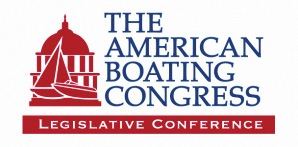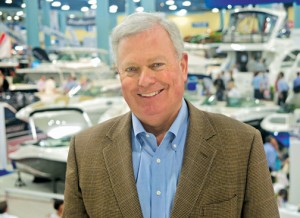American Boating Congress
This article is found within the main article Navigating Washington.
May conference offers chance to influence policy
 On May 8 and 9, industry stakeholders from dealers to manufacturers to associations, will have a chance to come together to shape public policy at the American Boating Congress, the recreational boating industry’s annual comprehensive legislative conference.
On May 8 and 9, industry stakeholders from dealers to manufacturers to associations, will have a chance to come together to shape public policy at the American Boating Congress, the recreational boating industry’s annual comprehensive legislative conference.
ABC gives those in the industry an opportunity to not only learn about the issues facing the marine industry, but also a chance to take their concerns to the capital in visits with senators, representatives, administration officials and Congressional staff. This year’s ABC is being organized by the National Marine Manufacturer’s Association and co-hosted by 30 industry organizations, including Boating Industry.
The final agenda hasn’t been set yet, but keep an eye on BoatingIndustry.com and nmma.org/abc for updates.
We talked to NMMA President Thom Dammrich about ABC and why it’s important for the industry to attend.
Why should dealers, manufacturers and others in the industry attend ABC?
 I would suggest to people that the actions of Congress and government regulators potentially have more impact on their ability to be successful than almost anything else. They can design, produce and market the best product that consumers love and if regulators restrict the use of that product or do things that reduce the amount of money people have to spend on that product, it will make it harder for you to sell that product.
I would suggest to people that the actions of Congress and government regulators potentially have more impact on their ability to be successful than almost anything else. They can design, produce and market the best product that consumers love and if regulators restrict the use of that product or do things that reduce the amount of money people have to spend on that product, it will make it harder for you to sell that product.
It’s important that members of Congress and regulators in Washington understand the business of boating and the number of people we employ, the amount of money people will spend on it, the amount of people who enjoy it and the fact that boating enriches people’s lives. It’s not only an economic driver, it’s a driver of improved quality of life for the American public. We need to be sure that legislators and regulators are not, either intentionally or unintentionally, doing something that will impair the ability of the industry to prosper and continue to improve the quality of people’s lives through boating.
There’s been a concerted effort to get more groups involved in ABC this year. Why is that important?
It has taken me a while, but I’ve come to the view that our industry is like an ecosystem. Something that adversely affects one part of the industry today will eventually impact the entire industry. Too often we hear, “That’s a manufacturer’s problem, that’s a distributor’s problem, that’s their problem, that’s not my problem.”
I’ll give [an example]. There’s a lemon law proposed in one state and the local MTA said, “That’s a manufacturer problem, we won’t get involved.” If that lemon law passes, it increases the manufacturer’s cost. He has to increase the cost of the boat and that makes it harder for the dealer to sell. The dealer doesn’t sell the boat, the marina doesn’t put it in a slip, nobody sells any accessories for the boat. It affects the whole industry.
Everything cascades in every direction. We need the industry united on all the issues that affect any part of our industry.
One of the other things I tell people is that given the dramatic impact that Washington and state capitals have on your business, you wouldn’t leave it to your competitor to manage your production line. You wouldn’t leave it to your competitor to do your marketing. You wouldn’t leave it to your competitor to manage your distribution. Why do you leave it to your competitor to manage government relations? You need to be involved.
What would you say to someone who says, “We’re a small industry. They’re not going to listen to us in Washington”?
They do listen. We have a significant boating constituency in many, many, many Congressional districts and members of Congress do listen to their constituents.
I’ll give you a couple of examples of the power we can have when we unite. In the early ‘90s, when Congress passed the luxury tax, it devastated the industry. The industry got it repealed within two years. When the courts in California ruled that the Clean Water Act permitting applied to recreational boating, we went to Congress and got legislation passed in two years. It takes the average bill seven years to get passed in Congress. We got a bill passed in two years that exempted recreational boaters from the Clean Water Act.
When people get involved and we make Congress aware or we make regulators aware that what they’re doing is going to adversely impact the industry, the employment of 150,000 people or the enjoyment of 86 million Americans on the water, they listen. We have succeeded and continue to succeed.
For further information and schedule, visit these links:
American Boating Congress brings prominent policymakers, industry voices to Washington D.C.
American Boating Congress releases updated agenda, speaker lineup




